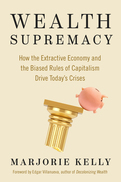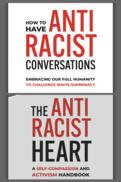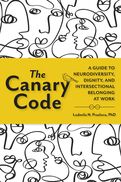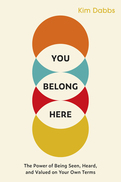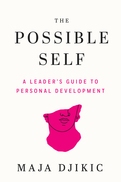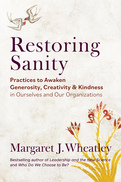Search Results: ""
Results 1255-1260 of 1358
Wealth Supremacy
2023
This powerful analysis explains how the bias toward wealth that is woven into the very fabric of American capitalism is damaging people, the economy, and the planet and explores what the foundations of a new economy could be.
This bold manifesto exposes seven myths underlying wealth supremacy—the bias that institutionalizes infinite extraction of wealth by and for the wealthy and is the hidden force behind economic injustice, the climate crisis, and so many other problems of our day:
The Myth of Maximizing—No amount of wealth is ever enough.
The Myth of Fiduciary Duty—Corporate managers' most sacred duty is to expand capital.
The Myth of Corporate Governance—Corporate membership must be reserved for capital alone.
The Myth of the Income Statement—Income to capital must always be increased, while income to labor must always be decreased.
The Myth of Materiality—Profit—that is, material gain-alone is real, while social and environmental damages are not.
The Myth of Takings—The first duty of government must be the protection of private property.
The Myth of the Free Market—There should be no limits on the sphere of influence of corporations and capital.
Kelly argues instead for the democratization of ownership: public ownership of vital services, worker-owned businesses, and more. And she sketches the outlines of a nonextractive capitalism that would be subordinate to the public interest. This is an ambitious reimagining of the very foundations of our economy and society.
This bold manifesto exposes seven myths underlying wealth supremacy—the bias that institutionalizes infinite extraction of wealth by and for the wealthy and is the hidden force behind economic injustice, the climate crisis, and so many other problems of our day:
The Myth of Maximizing—No amount of wealth is ever enough.
The Myth of Fiduciary Duty—Corporate managers' most sacred duty is to expand capital.
The Myth of Corporate Governance—Corporate membership must be reserved for capital alone.
The Myth of the Income Statement—Income to capital must always be increased, while income to labor must always be decreased.
The Myth of Materiality—Profit—that is, material gain-alone is real, while social and environmental damages are not.
The Myth of Takings—The first duty of government must be the protection of private property.
The Myth of the Free Market—There should be no limits on the sphere of influence of corporations and capital.
Kelly argues instead for the democratization of ownership: public ownership of vital services, worker-owned businesses, and more. And she sketches the outlines of a nonextractive capitalism that would be subordinate to the public interest. This is an ambitious reimagining of the very foundations of our economy and society.
Two antiracism books, one low price.
How to Have Antiracist Conversations: Embracing Our Full Humanity to Challenge White Supremacy
Utilizing Dr. Martin Luther King’s Beloved Community framework, activists will be empowered to create change and equity through fierce yet compassionate dialogue against racism and systematic white supremacy.
The Antiracist Heart: A Self-Compassion and Activism Handbook
The Antiracist Heart delivers a unique path to antiracist activism and introspection by applying neuroscience exercises, questionnaires, and journaling prompts based on the book How to Have Antiracist Conversations.
The Canary Code
2024
Exclusion robs people of opportunities, and it robs organizations of talent. In the long run, exclusionary systems are lose-lose.
How do we build win-win organizational systems?
From a member of the Thinkers50 2024 Radar cohort of global management thinkers most likely to impact workplaces and the first person to have written for Harvard Business Review from an autistic perspective comes The Canary Code—a guide to win-win workplaces.
Healthy systems that support talent most impacted by organizational ills—canaries in the coal mine—support everyone.
Currently, despite their skills and work ethics, members of ADHD, autism, Tourette Syndrome, learning differences, and related communities face drastic barriers to hiring and advancement. In the U.S., 30-40% of neurodivergent people and 85% of autistic college graduates struggle with unemployment. Like canaries in the mine, they are impacted by issues that ultimately harm everyone. Lack of flexibility, transparency, and psychological safety excludes neurodivergent, disabled, and multiply marginalized talent—and leaves most employees stressed and disengaged.
This unique book is a guide to change-making for CEOs, managers, HR leaders, and everyone who wants to contribute to building a more inclusive world.
The authors' over 25 years of experience spanning global diversity to neurodiversity leadership and extensive research on innovative practices of uniquely inclusive organizations around the world inform this books':
How do we build win-win organizational systems?
From a member of the Thinkers50 2024 Radar cohort of global management thinkers most likely to impact workplaces and the first person to have written for Harvard Business Review from an autistic perspective comes The Canary Code—a guide to win-win workplaces.
Healthy systems that support talent most impacted by organizational ills—canaries in the coal mine—support everyone.
Currently, despite their skills and work ethics, members of ADHD, autism, Tourette Syndrome, learning differences, and related communities face drastic barriers to hiring and advancement. In the U.S., 30-40% of neurodivergent people and 85% of autistic college graduates struggle with unemployment. Like canaries in the mine, they are impacted by issues that ultimately harm everyone. Lack of flexibility, transparency, and psychological safety excludes neurodivergent, disabled, and multiply marginalized talent—and leaves most employees stressed and disengaged.
This unique book is a guide to change-making for CEOs, managers, HR leaders, and everyone who wants to contribute to building a more inclusive world.
The authors' over 25 years of experience spanning global diversity to neurodiversity leadership and extensive research on innovative practices of uniquely inclusive organizations around the world inform this books':
- Explicitly intersectional approach to (neuro)inclusion
- Holistic understanding of humans and their social, cognitive, emotional, and physical differences.
- Holistic approach to organizational talent practices, from creating job descriptions and recruiting to onboarding, performance management, and leadership development.
- A globally inclusive approach that centers, celebrates and invites multiple voices from the neurodivergent community.
- A lead from where you are approach to change-making.
You Belong Here
2024
In a world overcrowded with labels, don't allow your identity to be defined by other people. Learn how to take back your power, choose to feed the aspects of your identity that serve you, and let go of those that don't.
Everyone feels like an outsider at some point in their life-when we walk into a room and think to ourselves, I don't belong here. To avoid these feelings of exclusion, many of us hide our authentic selves and allow others to define our identity.
You Belong Here offers a new framework that allows each of us to define how we want to be seen, heard, and valued on our own terms so we feel a sense of belonging in any situation. Further, it serves as a launchpad for organizational leaders and culture builders to create safe spaces for individuals to show up as their authentic selves.
Readers will explore our four identities:
When we fully leverage this and live with authenticity and purpose, we can be seen, heard, and valued in a way that gives us a sense of belonging at home, at work, and in society. Belonging is realized when we understand everyone is an outsider and it's the power to create space for those differences that unite us all.
Everyone feels like an outsider at some point in their life-when we walk into a room and think to ourselves, I don't belong here. To avoid these feelings of exclusion, many of us hide our authentic selves and allow others to define our identity.
You Belong Here offers a new framework that allows each of us to define how we want to be seen, heard, and valued on our own terms so we feel a sense of belonging in any situation. Further, it serves as a launchpad for organizational leaders and culture builders to create safe spaces for individuals to show up as their authentic selves.
Readers will explore our four identities:
- Our Lived Identity is made up of the aspects of our identity we inherit when we are born into the world.
- Our Learned Identity includes the parts of our identity that we've chosen or claimed as we make our way through the world.
- Our Lingering Identity is the identity we default to when we feel like an outsider and fall back into as a survival mechanism.
- Our Loved Identity is where we find our authentic selves and see ourselves through a lens of empowerment.
When we fully leverage this and live with authenticity and purpose, we can be seen, heard, and valued in a way that gives us a sense of belonging at home, at work, and in society. Belonging is realized when we understand everyone is an outsider and it's the power to create space for those differences that unite us all.
The Possible Self
2024
Awarded the Gold IBPA Book Award in the Psychology category.
Sometimes success isn't enough—discover how to achieve lasting, whole-life fulfillment through a simple five-stage plan that corresponds with the five key parts of ourselves.
We're often told that the key to success in life involves advancing in our careers, so why do feel stuck and unfulfilled when everything seems to be going right?
Adult development expert Maja Djikic explains that in order to discover our purpose and achieve real, lasting change, we need to move beyond narrowly targeted ideas and strategies like changing our mindset or slightly altering one aspect of our behavior. Instead, we need to go deeper and focus on our innate desires.
Djikic says that sustained change can only happen when our whole self moves holistically the same direction and at the same time. She introduces a transformational system called the Wheel of Change—a simple, five-segment plan that corresponds with the five key parts of ourselves: Desires, Actions, Emotions, Thoughts, and Body.
By understanding the mechanisms of these five integral parts, you will be able to escape the paradox of success without happiness and move towards your own path of fulfilling self-development.
Sometimes success isn't enough—discover how to achieve lasting, whole-life fulfillment through a simple five-stage plan that corresponds with the five key parts of ourselves.
We're often told that the key to success in life involves advancing in our careers, so why do feel stuck and unfulfilled when everything seems to be going right?
Adult development expert Maja Djikic explains that in order to discover our purpose and achieve real, lasting change, we need to move beyond narrowly targeted ideas and strategies like changing our mindset or slightly altering one aspect of our behavior. Instead, we need to go deeper and focus on our innate desires.
Djikic says that sustained change can only happen when our whole self moves holistically the same direction and at the same time. She introduces a transformational system called the Wheel of Change—a simple, five-segment plan that corresponds with the five key parts of ourselves: Desires, Actions, Emotions, Thoughts, and Body.
By understanding the mechanisms of these five integral parts, you will be able to escape the paradox of success without happiness and move towards your own path of fulfilling self-development.
Restoring Sanity
2024
What Would It Be Like to Restore Sanity? What would it be like to work together again in creative and generous ways? What would it be like to be curious about who you're with rather than judging or fearing them? What would it be like to engage together in exploring possibilities rather than withdrawing in conflict or disagreement? What would it be like to be working well together?
From 50 years working with leaders globally, I state with full confidence that leadership has never been more difficult. And it's not our fault. We've been good and caring leaders, we've led people in empowering, engaging ways to create meaningful, productive work. But now we face external conditions far beyond our control to change, dynamics intensifying at shocking speed.
The perfect storm is here, created by the coalescence of climate and human-created catastrophes. As leaders dedicated to serving the causes and people we treasure, confronted by this unrelenting tsunami, what are we to do? I state my answer to this also with full confidence:
We need to restore sanity by awakening the human spirit. We can achieve this only if we undertake the most challenging and meaningful work of our leader lives: Creating Islands of Sanity.
An Island of Sanity is a gift of possibility and refuge created by people's commitment to form healthy community to do meaningful work. It requires sane leaders with unshakable faith in people's innate generosity, creativity, and kindness. It sets itself apart as an island to protect itself from the life-destroying dynamics, policies, and behaviors that oppress and deny the human spirit. No matter what is happening around us, we can discover practices that enliven our human spirits and produce meaningful contributions for this time.
From 50 years working with leaders globally, I state with full confidence that leadership has never been more difficult. And it's not our fault. We've been good and caring leaders, we've led people in empowering, engaging ways to create meaningful, productive work. But now we face external conditions far beyond our control to change, dynamics intensifying at shocking speed.
The perfect storm is here, created by the coalescence of climate and human-created catastrophes. As leaders dedicated to serving the causes and people we treasure, confronted by this unrelenting tsunami, what are we to do? I state my answer to this also with full confidence:
We need to restore sanity by awakening the human spirit. We can achieve this only if we undertake the most challenging and meaningful work of our leader lives: Creating Islands of Sanity.
An Island of Sanity is a gift of possibility and refuge created by people's commitment to form healthy community to do meaningful work. It requires sane leaders with unshakable faith in people's innate generosity, creativity, and kindness. It sets itself apart as an island to protect itself from the life-destroying dynamics, policies, and behaviors that oppress and deny the human spirit. No matter what is happening around us, we can discover practices that enliven our human spirits and produce meaningful contributions for this time.


